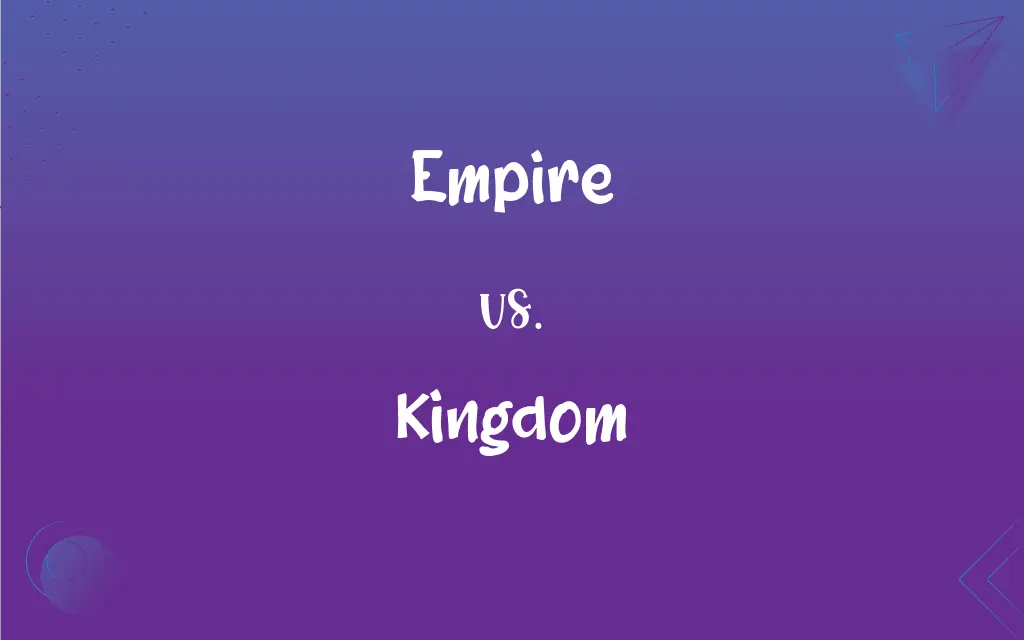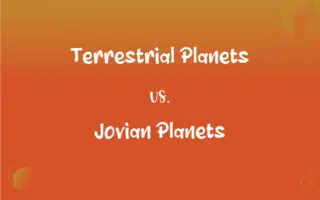Empire vs. Kingdom: What's the Difference?
Edited by Aimie Carlson || By Harlon Moss || Updated on October 11, 2023
An empire typically governs diverse territories and peoples usually obtained through conquest, whereas a kingdom is a single sovereign nation often unified by language and culture.

Key Differences
An empire embodies extensive groups of territories and peoples, all under a single supreme authority, often an emperor. This dominant authority characterizes an empire with the diverse regions and different cultures that it subjugates and governs. Unlike kingdoms, empires often expand their territories through conquest, absorbing various cultures, languages, and regions into a single political entity. For example, the Roman Empire enveloped various territories across Europe, Africa, and Asia, all under a centralized Roman governance.
On the other hand, a kingdom represents a political and geographical entity ruled by a king or queen, typically bound by a common language and culture. Unlike an empire, a kingdom might not embody a large, expansive territory or a collage of diverse cultures and languages. Kingdoms are often singular entities, sometimes established within the confines of natural geographic barriers or boundaries, and primarily homogenous in cultural and linguistic aspects. The Kingdom of Norway, for example, stands as a sovereign nation without substantial dominance over various other territories and cultures.
Empires often find their narratives interwoven with stories of conquest, expansive territorial dominance, and intricate governance over assorted cultures and languages. Historical empires, such as the British Empire, showcase a colossal impact over numerous continents, influencing various cultures, languages, and territories globally. Empires often exhibit a complex administrative machinery to govern the various, sometimes incongruent, entities within it, ensuring stability and control across large territories.
In contrast, kingdoms typically showcase a more unified narrative, with governance, culture, and territorial bounds that are often simpler and more homogenous than empires. A kingdom usually stands sovereign and might establish alliances or treaties with other nations but does not govern them directly. Kingdoms, such as the Kingdom of Denmark, have a noticeable unity in culture and administration, primarily governing territories that associate themselves directly with the cultural and administrative center.
One might find that while both empires and kingdoms symbolize forms of governance and territorial control, they distinctively vary in their scope, diversity, governance, and cultural composition. An empire, with its vast territories, diverse cultures, and complex administrative requirements, often stands in contrast to a kingdom, with its typically more uniform, culturally cohesive, and administratively straightforward structure.
ADVERTISEMENT
Comparison Chart
Ruler
Often ruled by an Emperor or Empress.
Ruled by a King or Queen.
Territories
Encompasses diverse territories and cultures, often acquired by conquest.
Primarily a singular, culturally unified territory.
Governance
Tends to have a complex administrative system for diverse territories.
Usually has simpler governance, often for a unified populace.
Cultural Diversity
Typically encompasses various cultures and languages.
Tends to have a more homogenous culture and language.
Expansion
Frequently expands through conquest and colonization.
May expand through marriage, alliance, or conquest.
ADVERTISEMENT
Empire and Kingdom Definitions
Empire
A vast political unit, often comprising numerous territories, and ruled by a single supreme authority.
The Roman Empire once spanned three continents, governing diverse cultures and regions.
Kingdom
It typically encompasses a more homogenous population and culture within its borders.
Despite its numerous islands, the Kingdom of Sweden largely shares a common cultural and historical heritage.
Empire
Typically extends its territory through conquest, establishing control over different peoples and lands.
Through strategic military campaigns, the Ottoman Empire expanded across Southeast Europe, Western Asia, and Northern Africa.
Kingdom
Often remains sovereign, engaging in alliances and treaties but maintaining autonomous governance.
The Kingdom of Belgium, while part of the European Union, retains its sovereign governance and royal traditions.
Empire
Possesses significant influence, often affecting global trade, culture, and governance.
The British Empire left a lasting impact on global trade routes, languages, and governance systems in various territories.
Kingdom
A political or territorial unit ruled by a monarch, often unified by culture and language.
The Kingdom of Spain has a rich history influenced significantly by various cultures, yet unified through language and culture.
Empire
It often governs diverse cultures, languages, and territories under a singular administrative entity.
The Persian Empire managed a plethora of cultures and languages under its centralized rule.
Kingdom
While it can hold colonies or territories, its administration usually reflects a cohesive and unified structure.
The Kingdom of England, prior to forming the United Kingdom, held numerous territories but maintained a centralized monarchical system.
Empire
Exhibits a complex administrative structure to manage varied and numerous territories.
The Byzantine Empire developed a multifaceted administrative system to govern its wide-reaching territories.
Kingdom
May have distinct boundaries often established through natural barriers, historical treaties, or conquests.
The Kingdom of Nepal is nestled amidst the Himalayas, creating natural boundaries that have influenced its historical development.
FAQs
How does a kingdom function?
A kingdom is a politically organized community or major territorial unit having a monarchical form of government headed by a king or queen.
What defines the territories of an empire?
Empires often consist of diverse territories, acquired through conquest or colonization, unified under a singular authoritative governance.
Is a kingdom culturally diverse like an empire?
Typically, a kingdom exhibits more cultural and linguistic homogeneity than an empire, which often governs diverse cultures.
Can a kingdom expand its territories?
Yes, kingdoms can expand their territories through means such as conquests, alliances, and marriages.
What is an example of a historical empire?
The Roman Empire, which governed diverse territories across Europe, Asia, and Africa, is a notable historical empire.
Is a king always the ruler of a kingdom?
While commonly ruled by a king, a kingdom can also be ruled by a queen.
What is a common governance challenge for empires?
Managing and integrating diverse cultures, languages, and territories is a common challenge for empires.
How do kingdoms establish their boundaries?
Kingdoms may establish boundaries through natural geographic features, historical treaties, and sometimes through conquests or defensive strategies.
How does governance differ between a kingdom and an empire?
Kingdoms often have simpler governance due to their typically more homogenous population, while empires require a more complex administration to manage diverse territories and cultures.
Are all kingdoms and empires autocratic?
While many kingdoms and empires have been autocratic, variations exist, and some have incorporated elements of democracy or oligarchy into their governance structures.
What is an empire?
An empire is a large sovereign territory that governs various regions and cultures, often through conquest, under a single ruler, typically an emperor.
Can a kingdom evolve into an empire?
Yes, historically some kingdoms have expanded and evolved into empires by acquiring and governing numerous territories and cultures.
Can you name a modern-day kingdom?
The Kingdom of Saudi Arabia is an example of a modern-day kingdom, ruled by a monarch and possessing a relatively homogenous cultural and linguistic profile.
Can a queen have higher authority than a king in some kingdoms?
Yes, in some kingdoms, a queen can hold the highest authority, ruling in her own right, such as Queen Elizabeth II of the United Kingdom.
Do empires always acquire territories through conquest?
While conquest has historically been a prevalent method, empires have also expanded through colonization, annexation, and inheritance.
What leads to the downfall of empires?
Various factors, such as political instability, economic crises, military defeats, and difficulties in managing diverse territories, often contribute to the downfall of empires.
How does religion play a role in empires?
Religion can play various roles in empires, sometimes as a unifying factor across diverse territories or as a tool to legitimize the ruler's authority.
Can a kingdom and empire coexist peacefully?
Yes, kingdoms and empires have coexisted peacefully at various points in history, often through treaties, alliances, or maintaining diplomatic relations.
Can an empire consist of multiple kingdoms?
Yes, historically empires like the Austro-Hungarian Empire and the British Empire have included multiple kingdoms under a single sovereign rule.
Who typically governs an empire?
An empire is usually governed by a singular, supreme ruler, often titled Emperor or Empress.
About Author
Written by
Harlon MossHarlon is a seasoned quality moderator and accomplished content writer for Difference Wiki. An alumnus of the prestigious University of California, he earned his degree in Computer Science. Leveraging his academic background, Harlon brings a meticulous and informed perspective to his work, ensuring content accuracy and excellence.
Edited by
Aimie CarlsonAimie Carlson, holding a master's degree in English literature, is a fervent English language enthusiast. She lends her writing talents to Difference Wiki, a prominent website that specializes in comparisons, offering readers insightful analyses that both captivate and inform.































































